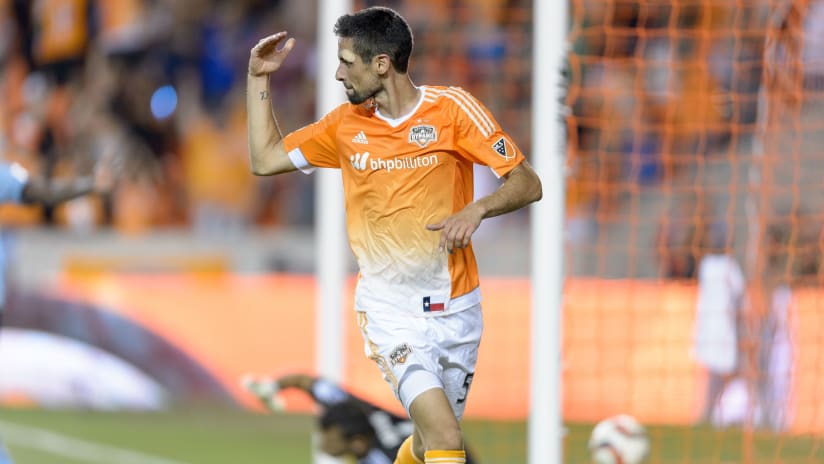This article first appeared in the March issue of
We are Orange Magazine.
When you meet Houston Dynamo defender Raúl Rodríguez, you quickly realize how much he values life off the field. The Barcelona native is proficient in English without a formal education in the language. He flashes a wide smile when requested for most appearances and media opportunities and treats club employees as equals. His personal email address includes the name of one of Shakespeare’s famous works. Once last season, on a cross-country flight the morning after playing 90 minutes in a league game, he declined an offer for an aisle seat from a staff member, insisting his middle seat was fine.
Three years ago, he and his wife Lorena heard a lecture with noted animal rights activist Gary Yourofsky. The couple dove into more research on the subject, including viewing the documentary “Earthlings,” a 2005 exposé of animal cruelty directed by Shaun Monson. After an intense process of reflection, Raúl and Lorena decided they’d change their diet to one closely resembling a vegetarian or vegan.
“My wife and I watched the lecture, and it was like a punch in the face,” Rodríguez said. “I always thought I was an animal lover and when I saw with my own eyes what a lot of animals were suffering for my decision [to eat meat], I decided to talk with Saioa Segura, one of the best nutritionists in Spain, and she worked for Espanyol, my former club.”
Segura, a specialist in sports diet, worked for CAR (Centre d'Alt Rendiment), where some of Spain’s best athletes practice, live and study. Now, entering his 10th professional season at age 28, Rodriguez has no regrets for his change in diet, which was inspired by moral, not health reasons.
“It was an important decision for me. I wanted to do it the right way and be able to perform at the highest level, so I asked her if I can change my diet and still perform at the maximum level and she said, ‘Yes, you can still do it, we’ll just have to work on different ways to get your protein and have a balanced diet.’ My diet changed quickly. I had help from a very good professional, and I feel great. My feelings were so powerful that I never had a doubt making the diet change.”
Segura suggested he keep eggs in his diet for nutritional reasons, but could move away from milk and other dairy products.
“I consider myself vegetarian but am not 100 percent vegetarian. There is no change in my feeling on the field. I feel better in terms of my decision, mentally, so I feel more comfortable, because it makes me feel good. For me, it was easy, as I never 'loved' eating meat. I always felt great, and had full energy, and performed well in medical tests, including blood tests, which have always been perfect. Now, I go to sleep knowing I am doing what I want to do and am able to do it within my job.”
Recovering from trainings and games still presents challenges, but more vegetarian-friendly offerings are now available. He works with Kristen Kizer, a clinical dietician at Houston Methodist and the Dynamo’s team dietician, and Pat Greer of Pat Greer’s Kitchen, who often caters team meals after practices in Houston, to make his evolving diet work.
“The beautiful thing I’ve discovered, thanks to my wife, is that a vegan or vegetarian diet can be delicious. With Kristen and Pat, we talk about the things we need, and Pat is an expert in a vegan diet. There are some recovery shakes and bars that we take, that you have to find, but there are a lot of brands that are making products without meat and milk. Whole Foods has a lot of products, including a shake that I drink that is vegan.”
Rodriguez still eats fish once every week or two, usually on Dynamo road trips when options are limited. This season, he plans to be more proactive and call ahead to the chef at the team hotel to request specific items he’d like to have available at team meals on the road.
The Spaniard lists Green Seed and Green Vegetarian Cuisine among his favorite restaurants in Houston. The vibe at vegan restaurants in Texas feels the same as his Iberian home.
“There is a funny thing about vegan restaurants—a different type of ambience and people. It was very clear in Span and is also clear here (in the United States). It is not a cultural thing (in either location).”
Rodríguez eats most of his meals at home. For breakfast, he likes, “cereals with hazelnut milk, toasts with strawberry jam and orange juice.” For dinner, his favorites include veggie coconut curry with rice and tofu. “My wife's cooking is delicious,” he says. “Also, most nights I will make a complete salad with spinach, different fruits, nuts, a lot of different vegetables, oil and vinegar.”
Rodríguez’s diet is one of several areas in his life he’d like to make a difference. In general, his decisions are based on being a good human being. His conscience even affects his footwear decisions on the field, with limited use of leather cleats.
“At a certain point in my life, I realized I need to make my own decisions, not only with diet, but other things I buy. For example, I have a problem with leather cleats. I still use leather on some of my boots, but the artificial cleats are so thin, it is difficult for me to get used to. I am still working on a lot of things in my life, but I feel great, because they are my decisions.”



